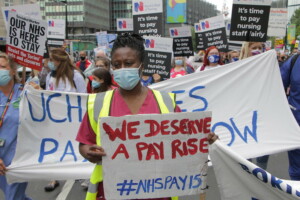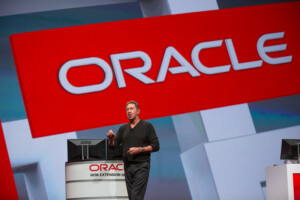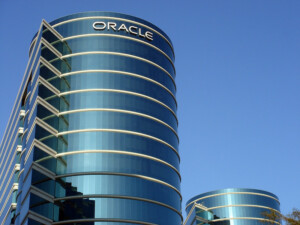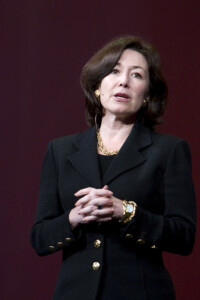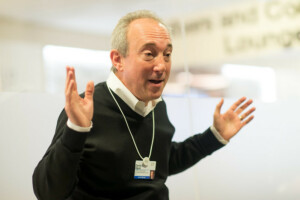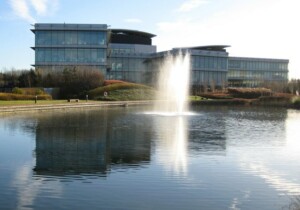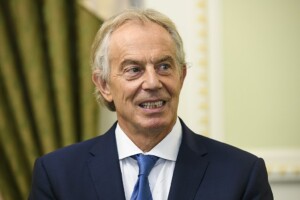HorrOracle: The Tech Giant Embedded in Our NHS
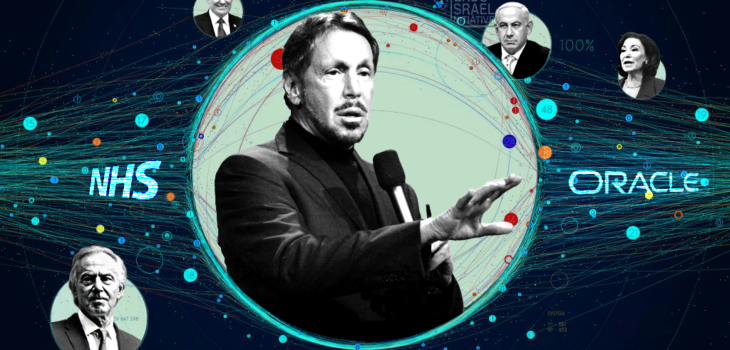
In recent years, both the Tories and Labour have been avidly promoting technology as the saviour of the NHS, rather than listening to what NHS workers say is needed. Healthcare and ambulance staff have been on strike almost continuously since 2022, demanding the bare minimum of fair pay and better conditions. Waiting lists continue to hit all-time highs amid chronic staff shortages, which have also meant that getting an NHS dentist in some parts of England is almost impossible. But what are the solutions according to the people who hold the purse strings?
According to the new Labour government, staff can simply work evenings and weekends (as if they don’t already). Furthermore, Wes Streeting, the new health minister, promises the increased use of the private sector to ‘fix’ the NHS. While in power, the Tories promised to throw lots of money at private tech companies, a trend which the new government looks set to continue. Oracle, one of these companies, is already banking massive profits from NHS contracts. However, this big tech corporate giant is mired in national and international controversies, so Corporate Watch teamed up with Keep Our NHS Public and Doctors in Unite to investigate Oracle.
While investigating, we found that:
- Larry Ellison, the chair and big boss of Oracle, is the 5th richest man in the world.
- Oracle has worked in the NHS for over 20 years and runs business-critical software for many parts of the health service. It has access to billions of patient records and sensitive data.
- Oracle has been profiting from the NHS since 2003. Since 2015, it has won contracts worth at least £214m and a share in contracts worth around £2bn. The company recently bought Cerner; a health-tech business already embedded in the NHS which has added nearly £361m to its total. Plus, a place on a shared contract worth £5bn.
- Ellison and former prime minister Tony Blair are good buddies, with the big tech boss bankrolling the powerful Tony Blair Institute (TBI).
- The company’s software and systems are used for biased facial recognition technology and the invasive surveillance of workers. It also trades in detailed portfolios of people’s personal data without their consent.
- Ellison and Oracle’s CEO, Safra Catz, are supporters of the Israeli government and promised to double their investments in Israel in a recent visit during the ongoing bombardment of Gaza.
- The tech billionaire is one of the biggest ever donors to the Israel military support charity – Friends of the Israel Defense Forces – in the US.
- Its most recent venture into the health service is the development of an academic and research campus at the University of Oxford. Here, it’s cosying up to health tech companies; Tony Blair; top UK government advisor, John Bell; and academic elites. It is also offering students scholarships.
ORACLE BUSINESS BASICS:
Big tech multinational, Oracle Corporation, was co-founded on June 16th, 1977 in Santa Clara, California, by Larry Ellison, Bob Milner and Ed Oates. Initially it was called “Software Development Laboratories (SDL)” changing its name to “Relational Software, Inc (RSI)” in 1979, and then to “Oracle Systems Corporation” in 1982. The tech company apparently took its name, and title of its main product, from a CIA project that the founders had worked on in 1977: the Oracle Database. In 1989 the company moved to Redwood City, California, finally changing its name in 1995 to Oracle Corporation.
WHAT DOES ORACLE DO?
The company works in software, databases, cloud services, artificial intelligence (AI), surveillance, data centre infrastructure and big data analytics. Customers range from government to private companies.
Oracle has been working for UK public services since the late 1990s and currently provides the UK government with data centres used by many departments including the Home Office, NHS Business Services Authority (BSA), and Lambeth and Croydon Borough Councils. In 2020, it announced a specific cloud for UK government and defence.
By 2015 the use of Oracle services had, in fact, become so widespread and expensive across the UK public sector that Westminster actually issued internal warnings for departments to start undoing reliance on tech companies – not that it’s achieved much in the years since, as our research revealed.
WHAT ARE ORACLE’S CLOUD SERVICES?
The term ‘cloud services’ seems to appear everywhere now. But what are they?
Simply put, they are IT and digital infrastructure, software or platforms, available online, that companies, governments or individuals can rent from a private company. Instead of paying to build, run, and maintain IT systems, a company or institution can opt to rent these systems from a private company. One example of infrastructure that our government rents from Oracle is its massive database system, Oracle Cloud. Instead of having a publicly owned and secure national database, the UK government and Ministry of Defence chose to outsource its structure and pay private companies to store national data in its data centres. Some of Oracle’s infrastructure rivals are Amazon Web Services and IBM Cloud.
Software is also sold as a service and can be accessed online by the buyer. Examples of this include Microsoft 365 and Dropbox. These services can be rented from a seller and they deal with things like physical space needs, maintenance and security. Private companies not only profit from these setups, but they also hold a lot of power in owning and controlling the systems.
Another example of services that can be rented from private corporates can be seen on Google Cloud Platform. This gives the user access to options like Google storage, databases, analytics, machine learning (AI), and text/ speech in multiple languages, all in one place. The user doesn’t have to have a massive server of their own to run all this on, Google has all the big stuff, and renters just use their systems, acting as digital landlords.
Oracle is one of a small group of ‘cloud capable’ US Big Tech organisations. In addition to owning data centres, it also shares ’public cloud’ services through deals with Microsoft. Both of these enable it to sell services to private or public bodies. Its size and profits have enabled it to dominate a market where buyers rapidly become reliant on cloud services, not least because there’s no genuine public (state-funded) alternative.
The NHS uses private companies such as Oracle for the very important development and running of its digital infrastructure. Seemingly, there hasn’t ever been any discussion of the NHS investing in its own alternative cloud services. Campaigners have been highlighting major concerns about this, given the sensitivity of patient-related data. Another issue – given continuing cuts to healthcare budgets – is that a company can price change and there is little option for a buyer to do anything about it.
Partnerships, Profits and Global Reach
In December 2020, Oracle moved its headquarters to Austin, Texas, just as it was announced as the fourth largest software company in the world. The company now has $138.08 billion (£110.82 billion) in assets with $13.28 billion (£10.66 billion) of revenue reported in the first quarter of 2024 and employs approximately 164,000 people. Its current chair and owner, with 41.69% of shares, is Ellison, who shares power with vice-chair Jeff Henley and CEO Safra Katz.
As a measure of its global availability and the growing popularity of AI, Oracle Cloud is currently available in 24 countries. This includes over 100 cloud services designed “to run any application, faster and more securely, and for less [money]’”. It works in many sectors including communications, construction and engineering, energy and water, financial services, food and beverage, health, hospitality, insurance, life sciences, local government, the public sector and retail.
Oracle likes to get cosy with other top tech companies and in 2019 it announced a partnership with Microsoft. This agreement meant that both companies’ databases, or clouds (Oracle Cloud and Microsoft Azure respectively), became directly connected, allowing for customers to store data and run software on both/either connected platform(s). Both companies felt this strengthened their positions enabling them to compete with the market leader Amazon Web Services (AWS). The partnership seems somewhat asymmetrical with Oracle appearing as the junior partner having (or developing) 63 data centres globally while Microsoft operates over 300.
In April 2024 Oracle and Palantir announced a partnership to work together to provide defence and intelligence solutions to businesses and governments and, to defend western interests. This arrangement allows Palantir’s infamous platforms to be used on Oracle’s systems anywhere in the world.
NHS Profiteering
Since 2015, Oracle has won contracts worth at least £214m. These contracts, mostly for databases and IT systems, have been steadily increasing to a value of at least £29m in the last three years alone. Many of these contracts are with NHS Business Services Authority (NHS BSA); one of the most recent was issued in 2022 for vital NHS IT systems, worth £2.4m. In addition to this, the company has a share in contracts worth around £2bn, although public records don’t disclose the amount given to individual companies in these vast multi-billion pound deals.
However, Oracle has a longer history of securing profitable NHS contracts; the first instance we found was in 2003. It was subcontracted by BT to work on the NHS Care Records (or NHS Spine/data spine) system for digitalising patient records. Following this it was part of the NHS’s IT systems overhaul, called the National Programme for IT. This project was ultimately abandoned due in part to low trust and take up amongst staff and patients.

Oracle was already key to the NHS, 20 years ago, supplying databases and infrastructure to other private providers within the health service. Additionally, 70% of NHS Trusts use Oracle systems, particularly in financial and back-office systems and the electronic booking service. The then director general of NHS IT said that the savings Oracle helped them make could then go back into contracting Oracle for more services.
Since 2023, the tech company seems to be on a roll winning contracts worth nearly £17m since 2023. For example, in 2023, it won a contract worth over £8m for the UK Health Security Agency. Another to build the system to integrate ”all financial processes” across NHS England’s 42 Integrated Care Boards for NHS Shared Business Services. This is an arm’s length body run with notorious private vendor, Sopra Steria, that deals with important NHS services including finances, digital, and procurement). It’s been working with the body since 2008. From public contracts already published in 2024, it looks certain these profits will continue to rise.
Oracle’s profit from UK health contracts has increased further since it bought Cerner (see below). Following the acquisition in June 2022, our research found it has won additional NHS contracts worth nearly £361m. It was also awarded a place on a shared contract worth £500m for Clinical Digital Solutions with NHS London Procurement Partnership.
The increase has come from multiple areas of the NHS, Department of Health and Social Care, the Care Quality Commission, and the UK Health Security Agency.
Oracle Buys Cerner
In December 2021 Oracle announced an agreement to buy Cerner, an American health information technology company, for $28.3 billion (£22.7 billion) cash, creating a new branch of the company called Oracle Health. This deal included Oracle gaining many of the contracts Cerner had already obtained as a government-accredited company on the NHS Health Systems Support Framework (HSSF) to develop IT infrastructure for the digital transformation of the NHS. This includes contracts for the use of: Cerner Millennium, an electronic patient record; HealtheIntent, an analytics platform; the Cerner electronic prescribing and medicines administration (ePMA) system; and the Cerner Health Information Exchange (HIE), a platform for sharing information electronically between different healthcare providers and patients.
At the time of the takeover, Cerner was one of the biggest health tech suppliers for electronic health records in the US, a market that Ellison was keen to get in on. But according to reports from the period, Cerner wasn’t functioning and its failures were serious, and sometimes tragically fatal. Three years since the takeover, hundreds of employees have been laid off, and there have been many problems with the contract with the US Department of Veteran Affairs. Ellison’s ‘dream’ hasn’t been so straightforward.
The Cerner acquisition was seen by tech investors as one of the biggest deals in healthcare of the year, along with Microsoft’s $19.7 billion (£15.7 billion) deal to buy Nuance Communications, a developer of conversational AI including voice-enabled documentation of patient-provider meetings (aka ambient clinical intelligence). So, in one year just under $50 billion (£47 billion) was spent by two partnered health-related corporations trying to dominate the healthcare market for goods and services. In at least one instance this purchase has given Oracle a contract that spans over a decade at Sheffield NHS Trust, which recently signed a £85m contract for digital patient records.
Catz, CEO of Oracle, stated that the acquisition would generate significant income and added that “Healthcare is the largest and most important [goods and services] market in the world—$3.8 trillion (£3 trillion) last year in the United States alone, and that Cerner will be a huge additional revenue growth engine for years to come”. However, it seems the financial returns were not as great as expected and that the Cerner purchase is slowing the organisation’s growth; in the US this has led to hundreds of job cuts in its health unit.
So, what in the NHS has Mr Ellison bought to ‘sit’ and be processed on his ‘clouds’? From a search of the tech literature and contracts his purchase includes these NHS Providers and other organisations and involves data from millions of patients:
Providers using Cerner (approximate patient numbers in brackets)
MILLENNIUM/ HEALTHEINTENT: NCL (1.4 million); NEL (2 million); NW London (2.2 million); Wirral University Teaching Hospital HS FT (400,000); Bradford Teaching Hospitals NHS FT (550,000); Calderdale and Huddersfield NHS FT (453,000); East Lancashire Hospitals NHS Trust (530,000); Croydon Health Services NHS Trust (27,000); Kingston Hospital NHS FT (350,000); Lewisham and Greenwich NHS Trust (1,000,000); Milton Keynes University Hospital NHS FT (252,000); Royal Berkshire NHS Foundation Trust (500,000); Royal United Hospitals Bath NHS FT (500,000); St George’s University Hospitals NHS FT (1.3 million); Epsom and St Helier University Hospitals NHS Trust (490,000); ; Surrey and Sussex Healthcare NHS Trust (744,000); West Suffolk NHS FT (280,000); Sheffield Teaching Hospitals NHS FT -starting late 2024 (1.5 million)
CERNER HIE to move SHARED CARE RECORD data around a region or further (with population estimates): Great Northern Care Record (3.2 million); East of England Care Record (5.8 million); oneLondon Care Record broken down as: NCL Integrated Care System (ICS) (1.4 million); NW London ICS (2.2 million); SEL ICS (1.9 million) ; NEL ICS (2 million); SWLICS (3.6 million).
Oracle’s Stealth Moves On the NHS
Accenture has been one of Oracle’s largest partners for about 30 years, and Oracle continues to invest heavily in this strategic relationship. Accenture recently purchased UK-based Nautilus Consulting, a company highly experienced in the procurement and implementation of Oracle Health’s (then Cerner’s) Millennium programme, to help with Oracle’s growth in the NHS.
In North West London, the Integrated Care System (ICS) now has 12 acute hospitals using the same Oracle electronic healthcare records (EHR) database. This has been praised by the tech company’s UK general manager, Distie Profitt, as helping staff across the system to make more informed care decisions.
What are Integrated Care Systems?
Integrated Care Systems (ICS). In theory, these give patients easier access to a range of services in their community: merging health, mental health, social care etc. Extending ICS regions across the UK sets up a system to pay per head providing healthcare from a set pot of funds. But this actually means the less they provide, the more surplus or profit they make. And as NHS for Sale notes, there’s no legislation to prevent private companies running, or bidding for, large chunks of ICS. Critics have warned that the true remit of ICS is to embed “private companies in running the NHS together with digital and data systems imported from the US healthcare market and insurance firms”. Over 200 companies are now accredited with NHS England to support ICS dealing with data and digital systems, many of which are US-owned giants.”
Matthew Swindells, in 2018 named one of the most influential people in the NHS, is currently chair of four of these acute trusts. Before taking up his current position he was a deputy chief executive and NHS national director of operations and information, from 2016 to 2019. Prior to this, he worked at Cerner for almost six years, in a senior health strategy position. In fact, his whole career seems to swing between Cerner and the NHS with the occasional stint within government such as between 2005-2007 when he was special advisor to then-Health Secretary, Patrica Hewitt, under the Blair government.
In 2018, during Swindells’ time at NHS England, the Health Systems Support Framework (HSSF), a “one stop shop” for NHS purchase of digital services from private companies, was set up. Cerner was one of the first businesses named on his fast-track shopping list. In the three years that Swindells held this NHS position, the amount of contracts going to private companies ballooned. In 2016 Cerner received £19.2m for two NHS contracts and a place on a shared contract worth £500m.
In 2019 he left the NHS again to take up a role as an advisor to private health company, Accenture and an adviser position at Peter Mandelson’s consultancy firm, Global Counsel. This is before returning one more time to the NHS as chair of four of the acute hospitals. Clearly, the ‘revolving door’ is always open to him.
While the London Care Record, which runs off of Oracle Cerner technology, has claimed big wins for the NHS, it nevertheless begs the question of whether private companies, always on the lookout for further work and profit, can be objective in measuring their own successes. In order to provide truly integrated care, ICSs will require ‘joined up’ records i.e. data collected from community care will need to be curated and linked to NHS records. If providers may move towards a single EHR supplier across an ICS, as has happened in North West and North Central London, it seems likely that for reasons of technical simplicity, there will be huge opportunities for Oracle to gain community care data contracts in areas where Oracle’s Millennium predominates.
Another string to Oracle’s bow was its takeover of the NHS-owned NEP cloud, which came in 2019. Before the takeover, this had been the only state-funded, not-for-profit digital service finance and procurement provider, run by the NHS for the NHS in England. It served over 35,000 system users with over £20 billion of revenue flowing through it each year while processing 1.2m transactions each month. It has now had to migrate 37 organisations to Oracle. The move was supposedly made due to limited NHS resources and the new solution includes use of Oracle cloud data storage and software with regular upgrades every three months to enable support ‘for an ever-changing NHS’ into the future.
PEOPLE
Ellison and Catz are the main decision-makers at Oracle Corporation. At the time of writing, co-founder, Ellison, is the 5th richest man in the world, worth £168.8bn according to Forbes. He owns a Hawaiian island, rubs shoulders with the world’s elite and hosts
people at his Californian wellness retreat for the super-rich. He has entertained Blair on his gigantic yacht, offered his research facilities to the US Government for free during the pandemic, asked Benjamin Netanyahu to join Oracle’s board of directors (the Israeli prime minister refused but accepted a holiday with him on his island), funded Elon Musk’s Twitter-takeover, hangs out with Bill Gates, and was best friends with Steve Jobs.
Catz is Oracle’s Israeli-American CEO, worth $2 billion (£1.6 billion) at the time of writing and a director at Disney and a Trump donor. She is also a member of the Homeland Security Advisory Council in the US, established a few months after Sept 11th, at the height of the so-called ‘War on Terror’. This council directly supports and advises the president on matters of homeland security (including terrorism, immigration, cybercrime, and borders). So it’s a very useful position for the head of a tech company that operates within weapons systems and conducts mass data gathering (or what some call surveillance, including targeting left-wing protests).
SOME OF ORACLE’S OTHER POWERFUL CONNECTIONS:
- Rona A. Fairhead (or Baroness Fairhead) has been on the executive board of Oracle since 2019. She is a member of the House of Lords and former minister of state at the Department for International Trade between 2017-2019, where she was involved in digital strategy. She was also chair of the BBC trust from 2014 to 2017. Following a government committee hearing, regarding conflict of interest, a ban was placed on her advising Oracle on bids and contracts with the UK government in any way that would advantage the company unfairly and from lobbying on their behalf for two years after leaving the ministry.
- Vishal Sikka is a director of Oracle and former CEO of Indian multinational tech company Infosys. Infosys was co-founded by Rishi Sunak’s father-in-law N.R. Narayana Murthy (a large chunk of Sunak’s family wealth comes from this connection). Sikka resigned from Infosys following the controversy raised by whistle-blowers in India about massive compensation, severance packages, and salaries, including allegedly overvalued acquisitions and suspect hiring practices.
- Awo Ablo has been a director at Oracle since 2022. She is also the Executive Vice President and Company Director of the Tony Blair Institute.
- Sukhendu Pal worked with Oracle in the UK for a decade as general manager, between 1985-1995. Following this he founded a consultancy company, Sirius & Co., that claims to work with some of the world’s richest corporations. The London-based firm also works with central and local government.
- David B Agus – Ellison’s lifelong friend and co-founder of Sensei (a wellness retreat for the super-rich on Ellison’s personal Hawaiian island or at his private ‘desert oasis’ estate in Palm Springs) and CEO of the Lawrence J. Ellison Institute for Transformative Medicine. Agus is a doctor, cancer researcher, and co-chair of the Global Health Securities Consortium (more to follow on this).
ELLISON’S POWERFUL WEB: INSTITUTES AND FOUNDATIONS
Over the years Ellison has set up several (allegedly) philanthropic institutes and foundations. These include:
- The Ellison Medical Foundation was opened in 1998. Until 2013, it focused on ageing, health education, research and funding, and during this time Ellison invested heavily in anti-ageing research. He has previously said he wants to achieve immortality.
- The Ellison Institute of Technology (EIT) was founded in the US in 2016. Similarly, its stated aims are cancer research and treatment, and global public health. Tony Blair is the executive chairman of the institute. The Lawrence J. Ellison Institute for Transformative Medicine is another name used interchangeably with the EIT. Ellison set up the institute with Dr David B. Agus (see below).
- The Larry Ellison Foundation was founded in the US in 2018 and relaunched in London in 2019. The foundation’s stated aims were biomedical research into ageing, but also various other projects, from global health to wildlife conservation. In its first couple of years in the UK it hired Boris Johnson’s father-in-law, Matthew Symonds, as the executive director of the foundation. Symonds, co-founder of the Independent and a long-standing fan of Ellison, published a book in 2003 about the tech billionaire titled Software: An Intimate Portrait of Larry Ellison and Oracle. Less than two years after he established the foundation, Ellison announced the closure of its UK arm in order to focus on Covid-19.
During the short time that this last foundation was run from the UK, Ellison managed to bag himself a large chunk of government contracts which included part of a shared software contract worth £1.2 billion for crown commercial services, a shared cloud services agreement for £750m for government and public bodies, and a £23.4m contract with the Ministry of Justice. At the time, the tech company was already working with the Home Office and the Department of Work and Pensions, making a total of at least £76.6m worth of contracts for the period.
ELLISON’S POWERFUL WEB: The ‘University of Ellison’
In October 2023 the US-based Ellison Institute of Technology (EIT) announced the construction of an Oxford Campus for new research and development, designed to “bring together innovative thinkers from around the world” to support Ellison’s primary mission of “solving four of humanity’s most challenging and enduring problems” namely: medical science and healthcare, food security and sustainable agriculture, clean energy and climate change, and government policy and economics. It aimed to bring together “world leaders, scientists and entrepreneurs” and to “find and fund the next generation of technical entrepreneurs and political leaders”, clearly indicating Ellison’s inherently undemocratic belief in the importance of corporations plus elite institutions as most important agents of change.
Oracle, like other commercial tech corporations, provides selected universities with access to the kind of advanced tech required for large databases and machine learning. Individual public universities would otherwise be unable to independently afford this level of tech, and the research these relationships facilitate therefore helps boost their international academic status. What the corporations get in return is a kind of intellectual monopoly on cutting-edge research, protected by non-disclosure agreements imposed on the students cherry-picked for the work, as well as a kind of ‘fish farm’ for private firms to poach the leading scientists of the future as well as connect them to the political leaders they are networked with to further their agendas.
At the EIT, research will be guided by a faculty of fellows made up of world leaders, scientists and entrepreneurs led by Dr David Agus, the institute’s founding director, CEO and entrepreneur. Other members of the faculty will include Professor Sir John Bell, former regius professor of medicine at the University of Oxford, as well as former UK prime minister Blair (more on him below). They will help to select, mentor and fund 20 students each year from Oxford University for the Ellison Scholars’ programme. These supposedly budding geniuses are to become leaders with “the skills to invent, improve, and manage the next generation of technology… “to solve humanity’s most challenging and enduring problems”.
The University of Oxford announced that Bell stepped down from his role as professor in March 2024, to take up the new position of president of the EIT Oxford. He will also become co-CEO of EIT Global, alongside entrepreneur Agus, and part of the EIT empire. Bell represents an enormous catch for Ellison: he founded the Wellcome Trust Centre for Human Genetics in 1993; in 2001 he was appointed non-executive director of biotech company Roche (he had £773,000 worth of shares in Dec 2023); in 2008 he joined the Gates Foundation Global Health Advisory Board which he has chaired since 2012; while in December 2011 he was appointed one of two UK Life Sciences champions by David Cameron, then UK prime minister; he also sits on the board of Genomics England Ltd. and chairs its science advisory committee; he chairs the controversial DNA-for-research collecting company ‘Our Future Health’ (while retaining his shares in its partner company Roche) ; and in the 2015 New Year Honours he was appointed knight grand cross of the Order of the British Empire (GBE).
OXFORD NANOPORE AND ORACLE IN THE NHS
The EIT investing in health and tech and its location at the Oxford Science Park means its new neighbours are a group of potential beneficiaries. Oracle has now partnered with at least one of these groups, Oxford Nanopore Technologies a firm working on genetic sequencing. In 2021, Ellison invested £150m in the company.
The government recently approved £2m funding for the NHS rollout of Nanopore’s successful Respiratory Metagenomics Project pilot at Guys and St. Thomas Foundation Trust. This is a part of the government’s strategic partnership with the US to tackle increased biological threats. This work will develop shared surveillance capacities between the two countries for humans, animals, plants and the environment.
Speaking about the collaboration with Nanopore, Oracle’s exec vice president of Oracle Vertical said, “[by] integrating genomic data into our existing applications and cloud infrastructure solutions, we can get these powerful tools into the hands of more people to solve critical health issues faster and improve patient outcomes to usher in a new era of genomic breakthrough.”
In May 2024, Nanopore hosted a conference with guest speakers Dr. Inès Hassan from the Tony Blair Institute and director of its Global Health Security Consortium (see below), and John Bell, CEO and president of the EIT.
BLAIR AND ELLISON – A LOVE STORY
Tony Blair and Larry Ellison‘s business ‘romance’ goes back at least as far as 2003, when Oracle signed an agreement under Blair to provide vast database systems and other software to the British government. By 2015, the use of Oracle had become so widespread and expensive that central government issued internal warnings for departments to undo reliance on the tech company.
The former UK prime minister’s chief venture at the moment is the Tony Blair Institute for Global Change (TBI), an international government and corporate advisory organisation with over 800 staff in 40 countries and close links to both Starmer and Sunak in the UK. Through this think-tank-come-lobbying group’s operations, Blair has carved out a space for himself in the modern political landscape that arguably gives him almost as much global power as when he was prime minister.
The TBI’s main areas of focus are technology, biotech and healthcare; in a report from January 2024, written by Blair and Lord William Hague, the institute spoke about its dreams for the NHS. Calling for a “new national purpose”, the pair spoke about their vision for an NHS Data Trust. This new Trust would use medical data as a ‘’competitive asset’’ to improve the performance of private AI algorithms. It would further open up NHS data to be accessed and used by private companies for their own profits.
Hague’s Intelligence Links
It’s worth noting that former Tory leader Hague also serves as an adviser to Hakluyt, a shadowy British corporate intelligence firm set up by former MI6 officials, alongside TBI’s John Bell. The group has relationships with around half of the world’s largest corporations, in addition to a wealth of private equity firms, global sovereign wealth and pension funds, and even, it would seem, the Labour Party. Last March, they were found to have hired ex-state intelligence personnel to infiltrate and snoop on climate activists on behalf of oil companies.
Ellison and Blair love to share, both in terms of personnel and finances. Abo Awlo is a senior director at both TBI and Oracle and since 2019 Ellison has donated nearly £410 million to TBI. Donations have been made through The Larry Ellison Foundation, up until 2022 (even though the foundation was dissolved in the UK in 2021), making it one of TBI's biggest donors. Blair is also known to take the occasional trip with Ellison out on the billionaire’s yacht.
Perhaps the starkest example of their overlapping web of interests is The Global Health Security Consortium (GHSC). A partnership between The Ellison Institute for Transformational Medicine, TBI and a group of scientists at Oxford, the organisation advises 'leaders’ across a range of areas including vaccines, genomics, and health technology, with staff at the consortium reporting to TBI as their employer.
SCANDALS AND VIOLATIONS
Ellison is no stranger to controversy; in true, eccentric billionaire style, he bought the entire Hawaiian island of Lānaʻi, in 2012. His $300m (£235.5m) purchase included most of the islands; homes and businesses, effectively making Ellison the landlord or boss (or both) of a whole island of people. Some locals feel like he controls too much of their lives and that their home has become a playground for the super-rich.
Ellison and Catz are both proud Israelis who make no secret of their support for Israel’s military. In 2017, Oracle gave Friends of the Israel Defense Forces (FIDA) $16.6m (£12.6m), its biggest ever single donation, which reportedly went towards wellbeing facilities for a new IDF training ground. Between 2012-2014 Ellison additionally donated at least $11m (£8.6m) to FIDA, bringing his known donations to at least $27m (£21.2m). He is also a founder member of US based, neoliberal Israeli lobby group, the Friends of Israel Initiative.
The founder of Oracle Israel, and vice president of Oracle Corporation from 1996 -2015, is Moshe Horev, a major figure in the country’s tech world. Before Oracle, Horev spent almost 11 years in senior positions in the Israeli airforce and military. In 2003, Horev spoke about the latest contract that Oracle had with the Israeli miliary, saying the deal “strengthened the longstanding strategic partnership between Oracle and the IDF, and positioned the company as one of the IDF’s main suppliers of computer solutions.” A year later, Oracle had work digitising several checkpoints in the West Bank. These checkpoints curtail and often exclude free movement of Palestinian people in the Occupied Territories.
In 2016, the tech company was brought to court in the US in a $34.5 billion (£27.1 billion) civil case made by Palestinian villagers and Palestinian-Americans. They were accusing the company of funding violations including war crimes, crimes against humanity and genocide, in relation to constructing Israeli settlements on Palestinian land in the West Bank. The US courts initially dismissed the $1 billion (£785.3m) lawsuit for being a ‘political’ issue that US courts could not decide, but in 2019 it was allowed to proceed and is still ongoing. Ellison also donated money to settlement infrastructure in 2007 on the occupied land of Sderot.
Catz visited Israel in January 2024 and promised that the company would ‘double’ its investment in the country by starting work on a second data centre in Israel to expand its cloud services. The current data centre in Jerusalem provides the military and government bodies with specialist cloud services and is built 50m underground, while Oracle Israel’s head office is, along with numerous other tech companies, located in Petah Tikva, Israel’s second-largest industrial centre.
Other scandals that Oracle has been involved in:
- According to Violation Tracker in the US, Oracle and its subsidiaries have paid $578.2m (£452.8m) for multiple offences since 2020.
- The tech company has bragged about helping police target civilians and protesters in the US and China.
- In 2021, Oracle was found complicit in human rights abuses in Myanmar in supplying the military with tech as it committed war crimes.
- It has paid $23m to settle charges that its subsidiaries in Turkey, India and the United Arab Emirates had used slush funds to bribe foreign officials between 2016 and 2019, and investigated for bribery in West and Central Africa.
- Oracle is known to lobby forcibly in the US and in 2006 hired John Ashcroft, former attorney general under George Bush, via his lobby firm. This move saw the tech giant benefit from controversial homeland security policies Ashcroft had been influential in implementing while in government, where he oversaw the growth of the homeland security industry. Just a few months after leaving government Ashcroft set himself up to work extensively with private tech companies working in that same area.
- Oracle sells its monitoring software to business managers in the US, sometimes very cheaply, where it can be used to intensively and intrusively monitor workers. Referring to its own systems, the company says it can ‘predict’ if a worker or team are going to be productive. The predictions are based on information including sensitive characteristics such as nationality, marital status, disability and gender.
CLASS ACTION IN THE US – ORACLE IS SELLING SENSITIVE DATA WITHOUT CONSENT
Oracle is currently in court in the US on charges of invasion of privacy, profiting from people’s data without their consent and breaking security and communications legislation. The class action case was brought after Ellison claimed to have detailed digital profiles of five billion people. It quotes him as saying, “How many people are on earth? Seven billion, two billion to go.”
The company trades in data profiles like those currently under investigation in the US court case. If you want to buy an audience for your product, Oracle can help you out for a fee. Some of the information that it sells comes from data it gathers on people from their activity on UK council websites through its subsidiary, AddThis. The information that companies ‘embedded’ on the sites collect could include a child’s disability or support needs for drug, alcohol or money troubles. Its involvement in the mass surveillance of citizens on UK council websites links Oracle to what open-source web browser Brave, calls the biggest data breach in the UK ever.
With the enforcement of GDPR regulations (Oracle’s products rarely provided any way for users to opt out of their data gathering) Oracle appeared to be getting out of the business of providing data to produce targeted advertising. From September 2024, all of Oracle’s advertising services and products, including BlueKai mentioned in the Brave report on data gathering on UK councils’ websites and the class action case, will cease to operate. All of Oracle’s web pages relating to this kind of data gathering now simply state that:
Oracle has determined that the Advertising business is not consistent with its current strategic vision. As a consequence, Oracle has decided to exit the Advertising business and will no longer be providing Oracle Advertising services and solutions.
Growing Pushback against Big Tech
“Oracle plays a key role in injustices the world over, from the invasive surveillance systems in the UK health and education systems to settler colonial construction projects in occupied Palestinian and Hawaiian territories, to war crimes in Myanmar” (Oxford BDS Coalition June 2024)
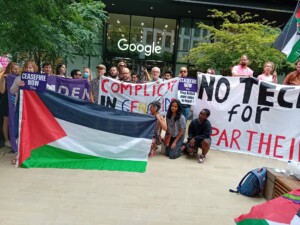
Photo credit – Palestine Solidarity Campaign and No Tech for Apartheid
Oracle is close to powerful people around the world, has huge influence on government policy, and the firm’s key players continue to rapidly expand their interests, obscene wealth, and influence through ‘philanthropic’ investments in multiple sectors. It brags about its questionable data-gathering practices despite scant observance of the fundamental right to privacy – to mention nothing of its unwavering resolve to continue financing a genocidal regime via its ongoing support for the Israeli state.
However, this isn’t going unnoticed and concern around the increasing influence of Big Tech in our lives has seen rising activism across the country. Throughout this investigation, we also spoke to several grassroots groups organising to fight and expose the creep of oppressive tech into our daily lives.
No Tech for Tyrants (NT4T) aims to cut the ties that universities in the UK have with the hostile environment, surveillance regimes and violent tech companies. They stressed that:
Oracle is not a company we should allow to embed itself in our institutions, from health systems to universities. Instead of throwing money at tech billionaires, this government should be investing in solutions that actually benefit workers and the public.
We also spoke to the Oxford Boycott Divestment Sanctions (BDS) Coalition a group made up of students and staff at the University of Oxford, organising around Palestinian liberation. They told us that they’re calling “for a financial, academic and procurement boycott of Oracle and its CEO Larry Ellison, at the University of Oxford and universities everywhere — there can be no role for violent corporations in places of education. Universities should promote justice and build up societies, not destroy them.”
These groups understand the threads that link our struggles and know that “an increasingly privatised NHS benefits nobody except the billionaires whose tech companies—like Larry Ellison’s Oracle—are reaping massive profits. With ties to the Israeli military, violent border tech, and harmful surveillance” (NT4T June 2024)

Photo credit – Oxford Action for Palestine
An International Movement
Big tech, by its nature, operates internationally. This is definitely the case for Oracle as it is for the workers and campaign groups organising for the just and ethical use of tech. In conducting this research, we contacted No Tech for Apartheid Ireland (NT4AI), one of the most recent groups to demand their tech companies divest from work supporting the apartheid Israeli regime.
The worker-led, Oracle for Palestine group (part of NT4A international), is running a campaign against the company’s involvement in Palestinian oppression. They reported that, just after October 7th, “all Palestinian charities and major global non-governmental organisations (NGOs) working in Palestine were removed from the Oracle donation matching site”. Meanwhile, it foregrounded Israeli-linked charities and committed to match-fund all donations to them. When staff raised concerns about the company’s pro-Israel support, they were told to take sick leave if they felt distressed. The message came loud and clear from top management; if you don’t like the pro-Israeli-state stance then you can leave.
In support of Palestine, Irish workers have issued a statement to their bosses, with a list of demands. Follow this link to sign the group’s open letter.
An NHS increasingly dependent on Big Tech monopolies is worrying. Price gouging and anti-competitive behaviour could naturally be outcomes of one tech company controlling too much of the digital infrastructure and data for the health service. None of the main political parties have any plans of substance for internal investment in the NHS’s own systems and private companies’ IT systems aren’t all they are cracked up to be.
But as we’ve seen we don’t always have to look to politicians for our answers and activists and campaign groups are filling the void left by a seemingly complicit government. Check out the links above to see how you can get involved.

Photo credit – Oxford Action for Palestine
Appendix: Addresses
Oracle Corporation UK Ltd
Oracle Parkway
Thames Valley Park
Reading, Berkshire
RG6 1RA
UK Field Offices in London – Moorgate, Reading, Birmingham, Bristol, Leeds, Linlithgow, London – Paddington, Epsom – The Kirkgate, Cambridge and Manchester.

